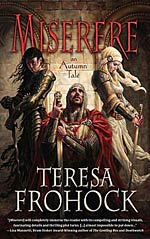
![]() MMOGC
MMOGC
6/2/2013
![]()
Books like Miserere are why I'm glad I make it a personal rule to finish reading all books I start. It's always tempting to put a title away for something else when the story doesn't capture me right away, and certainly I had my doubts that this one would be right for me when I first began. But sometimes, a book can be full of surprises.
I ended up loving Miserere. All I needed was some time to get into it, and part of the reason is its pacing. It's the kind of book that takes its time revealing itself to you, doling out details about its world in a trickle as you read. I was unable to make heads or tails of the story until I understood a bit of the context, that the universe of Miserere is made up of four planes: Heaven, Earth, Woerld, and Hell. Woerld is sort of like the first line of defense against Hell and its demons, as it were; all the religions there work to keep Fallen hordes from breaking through to Earth. It is in Woerld where the book mostly takes place.
Exorcist and man of faith Lucian Negru has been in exile for sixteen years, banished for abandoning his lover Rachael in Hell in exchange for the life of his twin sister, Catarina. Catarina, however, didn't want to be saved, as she'd sold her soul to the Fallen for the chance to rule Woerld. Lucian was crippled and imprisoned when he refused to go along with her plans, until one day he escapes and endeavors to save Rachael, who has since made it back from Hell, albeit possessed by a demon that is slowly taking over and killing her.
Along the way, Lucian also rescues Lindsay, a young Earth girl who had slipped through the Veil into Woerld, just as he had many years before. Like Lucian, Lindsay possesses special powers, and will one day become one of the Kathoros, able to activate magic through prayer. Lucian is determined to make it his duty to train and protect her, but that's easier said than done with Catarina's minions on his tail and traitors at the heart of the Kathoroi.
Such a rich world, with so much history and background. I don't think I was able to absorb it all until a third of the way through the book, mostly because not everything's explained right away. You're meant to be thrown into Miserere without much guidance, letting the story do the job of explaining the details as it progresses. Call me impatient, but I don't usually enjoy books like that; I much prefer it when the setting and characters are set up early so I know what I'm in for. But still, Miserere ended up making it up to me in spades!
Contrary to its description and the nature of its themes, this book isn't really about religion, though religious philosophies and the notion of faith are interwoven into the story. More significant are the ideas of redemption and mercy, of finding the strength and reason to go on again even after falling from grace. It's also about love, of whether or not it is possible to trust again after betrayal.
Speaking of which, one of the first things that struck me about this book is how beautiful the writing is. I felt that the interplay of emotions between Lucian and Rachael unfolded very naturally and was presented almost perfectly, as were the descriptions of Lucien's mixed feelings for his traitorous sister. And yet, the writing was not at all flowery to the point of distracting, nor did it disrupt the flow of the story, which made this a very easy and smooth read. The execution in the details was also phenomenal; I am thinking of one scene in particular involving an exorcism that is quite possibly one of the most awesome and yet horrifying things I've ever read.
I just breezed through the second half of this book, since by then it had me completely hooked. One night, I found myself still up at 3am because I'd lost track of the hours reading this. I'm so glad I kept my mind open and gave this book a little time, as the reward was very much worth it.
http://bibliosanctum.blogspot.com/2013/03/miserere-by-teresa-frohock.html